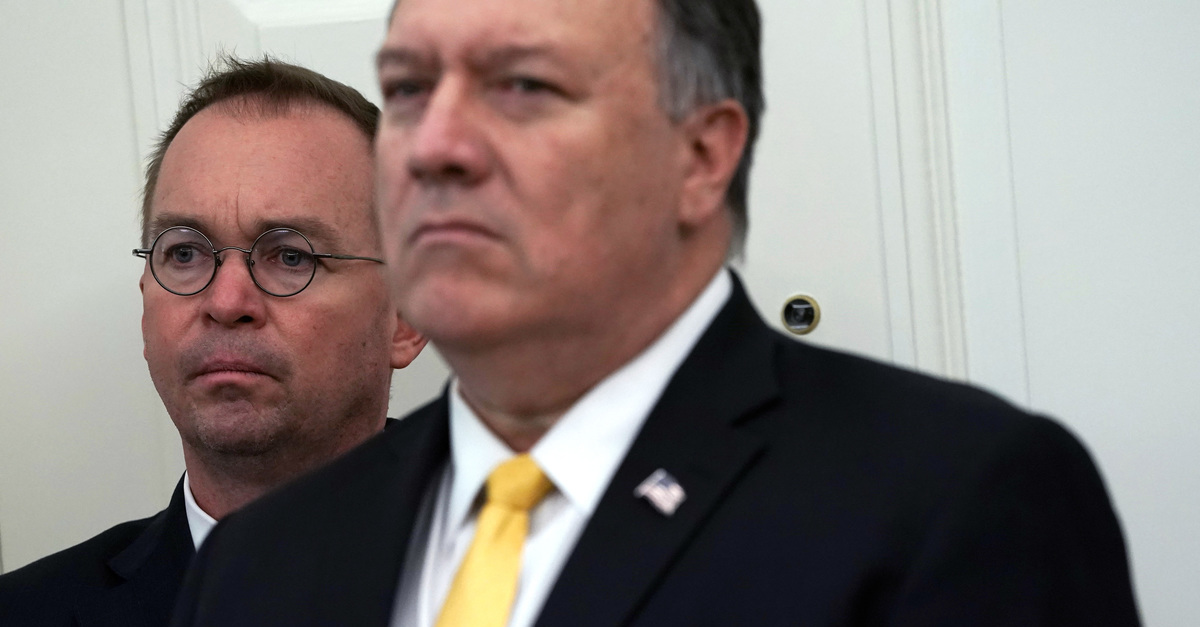
The latest developments in the ongoing impeachment of President Donald Trump subjected the White House and its allies to new accusations of obstruction.
On Thursday morning, the U.S. Government Accountability Office (GAO) issued a scathing report which criticized the 45th president and his apparatchiks at the Office of Management and Budget (OMB) for violating federal law by withholding congressionally-appropriated military aid to the Ukraine in exchange for a political. In no uncertain terms, GAO determined that OMB violated the Impoundment Control Act of 1974.
Whether direct this alleged legal violation directly implicated Trump, who directed the hold, however, is a matter of some dispute among legal experts. But the way OMB and others within the Trump administration have responded to GAO thus far is likely to present political—if not legal—headaches for the president sooner rather than later.
The nine-page GAO report notes:
OMB and State have failed, as of yet, to provide the information we need to fulfill our duties under the ICA regarding potential impoundments of [foreign military financing] funds.
We will continue to pursue this matter and will provide our decision to the Congress after we have received the necessary information. We consider a reluctance to provide a fulsome response to have constitutional significance. GAO’s role under the ICA—to provide information and legal analysis to Congress as it performs oversight of executive activity—is essential to ensuring respect for and allegiance to Congress’ constitutional power of the purse. All federal officials and employees take an oath to uphold and protect the Constitution and its core tenets, including the congressional power of the purse. We trust that State and OMB will provide the information needed.
In other words, GAO officials are accusing OMB officials—and State Department officials—of withholding information about the Ukraine scandal. Many legal observers noted that OMB’s and the State Department’s alleged stonewalling essentially amounts to obstruction of an official investigation.
Sen. Chris Van Hollen (D-Md.) leveled the accusation via Twitter:
Another big finding in [GAO’s] report: The Trump Administration blocked their inquiry—just as they are obstructing the congressional impeachment inquiry—which GAO finds to be of “constitutional significance.” This is coming from Congress’s nonpartisan, independent watchdog.
Cardozo School of Law Professor Kate Shaw also weighed in:
Just read the GAO decision and wow is it scathing. (Also loosely echoes the impeachment articles, though w/r/t conduct not just of POTUS but also other exec-branch entities – 1) abuse of power/violation of oath; and 2) w/r/t State & OMB, obstruction of the investigation) https://t.co/RGCQW4sEBO
— Kate Shaw (@kateashaw1) January 16, 2020
Former acting U.S. Solicitor General Neal Katyal later picked up on Shaw’s observation:
Want to highlight something @kateashaw1 noticed in GAO opinion. It doesn’t just conclude White House broke law w Ukraine aid (mirroring Article 1). Also says was obstruction of the investigation (Article 2)&raises profound constitutional worries. That obstruction still continuing pic.twitter.com/008da4KeUv
— Neal Katyal (@neal_katyal) January 16, 2020
Concern over efforts to keep a lid on the process of withholding the Ukrainian aid package have grown somewhat bipartisan as the impeachment process has dragged on.
Republicans for the Rule of Law, a disaffected group of libertarians and small-government conservatives without a home in Trump’s GOP, endorsed the Shaw/Katyal argument viz. White House obstruction of GAO as well.
“If the White House is so sure that all of its actions are perfectly legal, why are they spending so much energy on cover-ups?” the advocacy group asked out loud.
[image via Alex Wong/Getty Images]